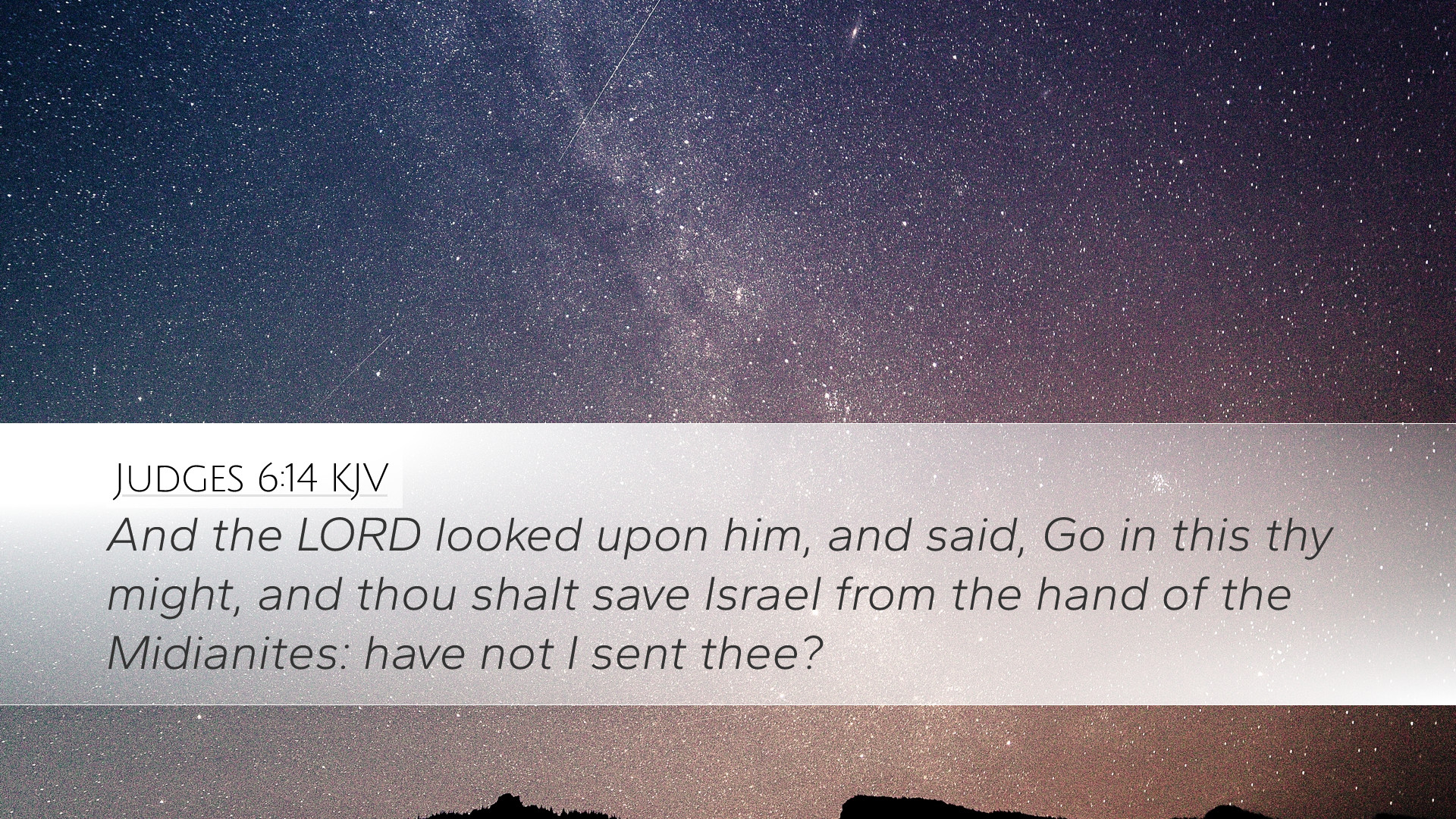Commentary on Judges 6:14
Judges 6:14 states: “And the Lord looked upon him, and said, Go in this thy might, and thou shalt save Israel from the hand of the Midianites: have not I sent thee?” This verse occurs at a pivotal moment in the narrative of Gideon, marking God’s calling and commissioning of him as a deliverer of Israel. Below is a detailed commentary based on insights from various public domain commentaries.
Contextual Background
The narrative of the book of Judges recounts the cyclical pattern of Israel's disobedience, oppression, and deliverance. After years of sinning against God, Israel finds itself under the dominion of Midian, a harsh oppressor as described in Judges 6:1-6. It is within this context of despair and fear that God chooses Gideon to bring about liberation. This verse encapsulates God’s direct intervention and empowerment of Gideon.
Divine Commission
Matthew Henry elaborates on the divine encounter, affirming that God personally addresses Gideon. The phrase “the Lord looked upon him” implies an intimate scrutiny and selection by God, signifying that Gideon is chosen for a specific purpose. This divine gaze represents not only recognition but affirmation of Gideon’s potential despite his own self-doubts.
Henry notes that God’s call often comes during seasons of fear or inadequacy, which is exemplified in Gideon’s reluctance and his response to God. The Lord’s assurance, “Go in this thy might,” emphasizes that strength does not originate from Gideon’s perceived capabilities but from God’s empowerment and purpose.
Empowerment for Service
Albert Barnes highlights the assurance given to Gideon that he is not only to go but that he will be victorious in his endeavors. The phrase “thou shalt save Israel” is a declaration of both mission and confidence. God equips those He calls, and this assurance is crucial for Gideon’s eventual courage to confront the Midianites.
God’s commission to Gideon here is a reminder for all leaders and believers that God often calls the unqualified and provides them with the necessary courage and strength. The directive to "go” indicates action—God does not merely call individuals to feel empowered but to act upon that empowerment in faith.
Theological Implications
Adam Clarke discusses the theological weight of God’s promise and commissioning. This verse highlights two essential truths: God’s sovereignty and the role of human agency in divine plans. Clarke posits that God does not bypass human involvement but instead, utilizes it in His redemptive work. Gideon’s story illustrates the manifestation of divine providence through the submission of a seemingly weak vessel.
This can be seen as a paradigm for pastoral ministry and spiritual leadership today. It suggests that God’s calling often comes to those who feel least capable. It reinforces the notion that in our weakness, His strength is made perfect (2 Corinthians 12:9).
Gideon’s Reluctance and God’s Assurance
Gideon’s immediate response is one of hesitation and self-doubt, as emphasized by various commentaries. He questions his own lineage—“my family is poor in Manasseh, and I am the least in my father’s house” (Judges 6:15). This underscores a common struggle faced by many when called to leadership or significant tasks.
Henry remarks that this reluctance is a relatable human experience. Even great leaders wrestle with inadequacies, yet it is crucial to recognize that God sees beyond our limitations. His perspective is based on the potential that He has instilled within us.
Application for Leaders Today
For pastors and church leaders, Judges 6:14 serves as a potent reminder of God’s calling and empowerment. The principles found in this verse encourage leaders to embrace their divine calling despite feelings of inadequacy. Emphasizing the importance of reliance on God’s power rather than personal capability can cultivate spiritual strength and resilience.
- Encouragement in Call: Understanding that calls to service often align with personal insecurities can provide solace and motivation for effective ministry.
- Faith in Action: Gideon’s eventual compliance with God’s call challenges believers to respond actively to God’s prompting even when they feel insufficient.
- Empowerment Through Trust: Recognizing that God’s plans involve human action empowers believers to take steps of faith in their ministries and calling.
Conclusion
Judges 6:14 encapsulates pivotal themes of divine selection, empowerment, and the intersection of human and divine action within the biblical narrative. Scholars, theologians, and pastors can glean vital insights for practical ministry and personal growth. Gideon’s journey from fear to action exemplifies the transformative effects of responding in faith to God’s call, demonstrating that when God commissions, He equips.


